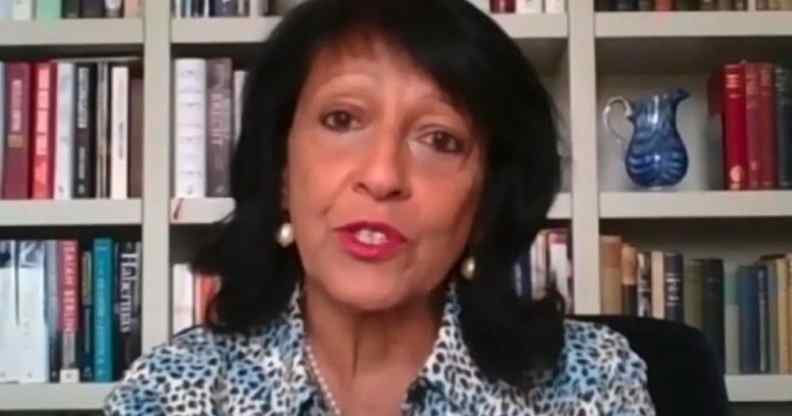Beleaguered equalities watchdog scraps disability committee after being dubbed ‘not fit for purpose’

EHRC chair Baroness Kishwer Falkner. (Sky News)
The Equality and Human Rights Commission (EHRC) is dismantling its Disability Advisory Committee amid widespread criticism of its commitment to equality.
According to the Disability News Service (DNS), the Disability Advisory Committee will cease to exist after 31 March. It had provided “advice and guidance” to the EHRC, informing its work “protecting and promoting rights and equality for disabled people”.
The EHRC told the publication that it had “always made clear that the committee was a time-bound structure”, however its term has previously been extended.
Simone Aspis, a member of the committee and campaigns and policy coordinator for Alliance for Inclusive Education, said she was “disappointed by the handling of this decision”, especially “given disabled people have experienced marginalisation as a result of COVID-19 and the continuing cuts to disabled people’s rights”.
“They are the most disadvantaged group of people,” she said. “How is the EHRC at a strategic level going to be able to move things forward without a consistent voice of disabled people?”
Evidence has been piling up against the EHRC over the last few months, as its stance on trans rights becomes more and more alarming.
Last month, Stonewall and the Good Law Project, supported by “every major LGBT+ charity” join the UK, declared the supposedly independent equalities watchdog no longer “credible” or “fit for purpose”.
This latest move is especially painful for those who are both queer and disabled.
Wayne Allingham, founder of LGBTQ Disabled Queer and Hear which runs accessible events with queer, disabled performers, told PinkNews it was “totally wrong” to get rid of the Disability Advisory Committee.
However, he added, even before the committee was scrapped, it wasn’t going far enough to help disabled folk.
He described the committee’s Disability Strategy as “not fit for anything”, said that the committee itself included too many able-bodied people, and that the full spectrum of disabled people, “from physical disability to hidden disability to mental health issues”, were not being listened to.
“It’s been far too long [that we’ve been] without a voice,” Allingham added.
“That’s why we do it ourselves.”
Speaking to the DNS, Mark Harrison, a member of the steering group of the Reclaiming Our Futures Alliance, agreed that there were “wider concerns about the independence and effectiveness of the EHRC and its ability to protect the human rights of disabled people”.
Harrison said that the alliance’s “good engagement and regular meetings” with the EHRC had come to an end around four years ago, and added: “Successive Conservative-led governments since 2010 have slashed their funding, destroyed capacity to take effective legal action and have made political appointments to key positions… It is our opinion that the EHRC is no longer independent of government or an effective human rights body.”
Jo Maugham, director of the Good Law Project, responded to the news on Twitter and said that the EHRC was “pretending” to be a human rights institution.
“The EHRC’s hostility to or neglect of the interests of trans people is conspicuous because the broader attack on trans rights is conspicuous,” Maugham said.
“But there is good evidence it is also hostile to/neglectful of the interests of other ‘unfashionable’ disadvantaged groups.”

